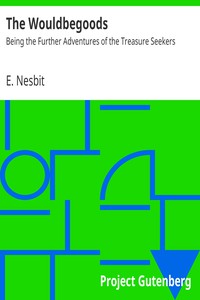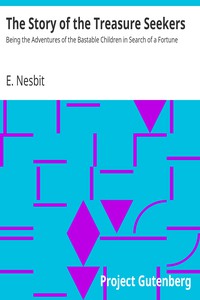The Wouldbegoods: Being the Further Adventures of the Treasure Seekers, E. Nesbit [red novels .TXT] 📗

- Author: E. Nesbit
Book online «The Wouldbegoods: Being the Further Adventures of the Treasure Seekers, E. Nesbit [red novels .TXT] 📗». Author E. Nesbit
He said—
‘Wait half a shake.’ And he put on his knickerbockers and jacket, and slipped a few peppermints into his pocket in case of catching cold. It is these thoughtful expedients which mark the born explorer and adventurer.
It was a little cold; but the white moonlight was very fair to see, and we decided we’d do some other daring moonlight act some other day. We got out of the front door, which is never locked till Albert’s uncle goes to bed at twelve or one, and we ran swiftly and silently across the bridge and through the fields to the Roman ruin.
Alice told me afterwards she should have been afraid if it had been dark. But the moonlight made it as bright as day is in your dreams.
Oswald had taken the spade and a sheet of newspaper.
We did not take all the pots Alice had found—but just the two that weren’t broken—two crooked jugs, made of stuff like flower-pots are made of. We made two long cuts with the spade and lifted the turf up and scratched the earth under, and took it out very carefully in handfuls on to the newspaper, till the hole was deepish. Then we put in the jugs, and filled it up with earth and flattened the turf over. Turf stretches like elastic. This we did a couple of yards from the place where the mound was dug into by the men, and we had been so careful with the newspaper that there was no loose earth about.
Then we went home in the wet moonlight—at least the grass was very wet—chuckling through the peppermint, and got up to bed without anyone knowing a single thing about it.
The next day the Antiquities came. It was a jolly hot day, and the tables were spread under the trees on the lawn, like a large and very grand Sunday-school treat. There were dozens of different kinds of cake, and bread-and-butter, both white and brown, and gooseberries and plums and jam sandwiches. And the girls decorated the tables with flowers—blue larkspur and white Canterbury bells. And at about three there was a noise of people walking in the road, and presently the Antiquities began to come in at the front gate, and stood about on the lawn by twos and threes and sixes and sevens, looking shy and uncomfy, exactly like a Sunday-school treat. Presently some gentlemen came, who looked like the teachers; they were not shy, and they came right up to the door. So Albert’s uncle, who had not been too proud to be up in our room with us watching the people on the lawn through the netting of our short blinds, said—
‘I suppose that’s the Committee. Come on!’
So we all went down—we were in our Sunday things—and Albert’s uncle received the Committee like a feudal system baron, and we were his retainers.
He talked about dates, and king posts and gables, and mullions, and foundations, and records, and Sir Thomas Wyatt, and poetry, and Julius Caesar, and Roman remains, and lych gates and churches, and dog’s-tooth moulding till the brain of Oswald reeled. I suppose that Albert’s uncle remarked that all our mouths were open, which is a sign of reels in the brain, for he whispered—
‘Go hence, and mingle unsuspected with the crowd!’
So we went out on to the lawn, which was now crowded with men and women and one child. This was a girl; she was fat, and we tried to talk to her, though we did not like her. (She was covered in red velvet like an arm-chair.) But she wouldn’t. We thought at first she was from a deaf-and-dumb asylum, where her kind teachers had only managed to teach the afflicted to say ‘Yes’ and ‘No’. But afterwards we knew better, for Noel heard her say to her mother, ‘I wish you hadn’t brought me, mamma. I didn’t have a pretty teacup, and I haven’t enjoyed my tea one bit.’ And she had had five pieces of cake, besides little cakes and nearly a whole plate of plums, and there were only twelve pretty teacups altogether.
Several grown-ups talked to us in a most uninterested way, and then the President read a paper about the Moat House, which we couldn’t understand, and other people made speeches we couldn’t understand either, except the part about kind hospitality, which made us not know where to look.
Then Dora and Alice and Daisy and Mrs Pettigrew poured out the tea, and we handed cups and plates.
Albert’s uncle took me behind a bush to see him tear what was left of his hair when he found there were one hundred and twenty-three Antiquities present, and I heard the President say to the Secretary that ‘tea always fetched them’.
Then it was time for the Roman ruin, and our hearts beat high as we took our hats—it was exactly like Sunday—and joined the crowded procession of eager Antiquities. Many of them had umbrellas and overcoats, though the weather was fiery and without a cloud. That is the sort of people they were. The ladies all wore stiff bonnets, and no one took their gloves off, though, of course, it was quite in the country, and it is not wrong to take your gloves off there.
We had planned to be quite close when the digging went on; but Albert’s uncle made us a mystic sign and drew us apart.
Then he said: ‘The stalls and dress circle are for the guests. The hosts and hostesses retire to the gallery, whence, I am credibly informed, an excellent view may be obtained.’
So we all went up on the Roman walls, and thus missed the cream of the lark; for we could not exactly see what was happening. But we saw that things were being taken from the ground as the men dug, and passed round for the Antiquities to look at. And we knew they must be our Roman remains; but the Antiquities did not seem to care for them much, though we heard sounds of pleased laughter. And at last Alice and I exchanged meaning glances when the spot was reached where we had put in the extras. Then the crowd closed up thick, and we heard excited talk and we knew we really HAD sold the Antiquities this time.
Presently the bonnets and coats began to spread out and trickle towards the house and we were aware that all would soon be over. So we cut home the back way, just in time to hear the President saying to Albert’s uncle—
‘A genuine find—most interesting. Oh, really, you ought to have ONE. Well, if you insist—’
And so, by slow and dull degrees, the thick sprinkling of Antiquities melted off the lawn; the party was over, and only the dirty teacups and plates, and the trampled grass and the pleasures of memory were left.
We had a very beautiful supper—out of doors, too—with jam sandwiches and cakes and things that were over; and as we watched the setting monarch of the skies—I mean the sun—Alice said—
‘Let’s tell.’
We let the Dentist tell, because it was he who hatched the lark, but we helped him a little in the narrating of the fell plot, because he has yet to learn how to tell a story straight from the beginning.
When he had done, and we had done, Albert’s uncle said, ‘Well,





Comments (0)